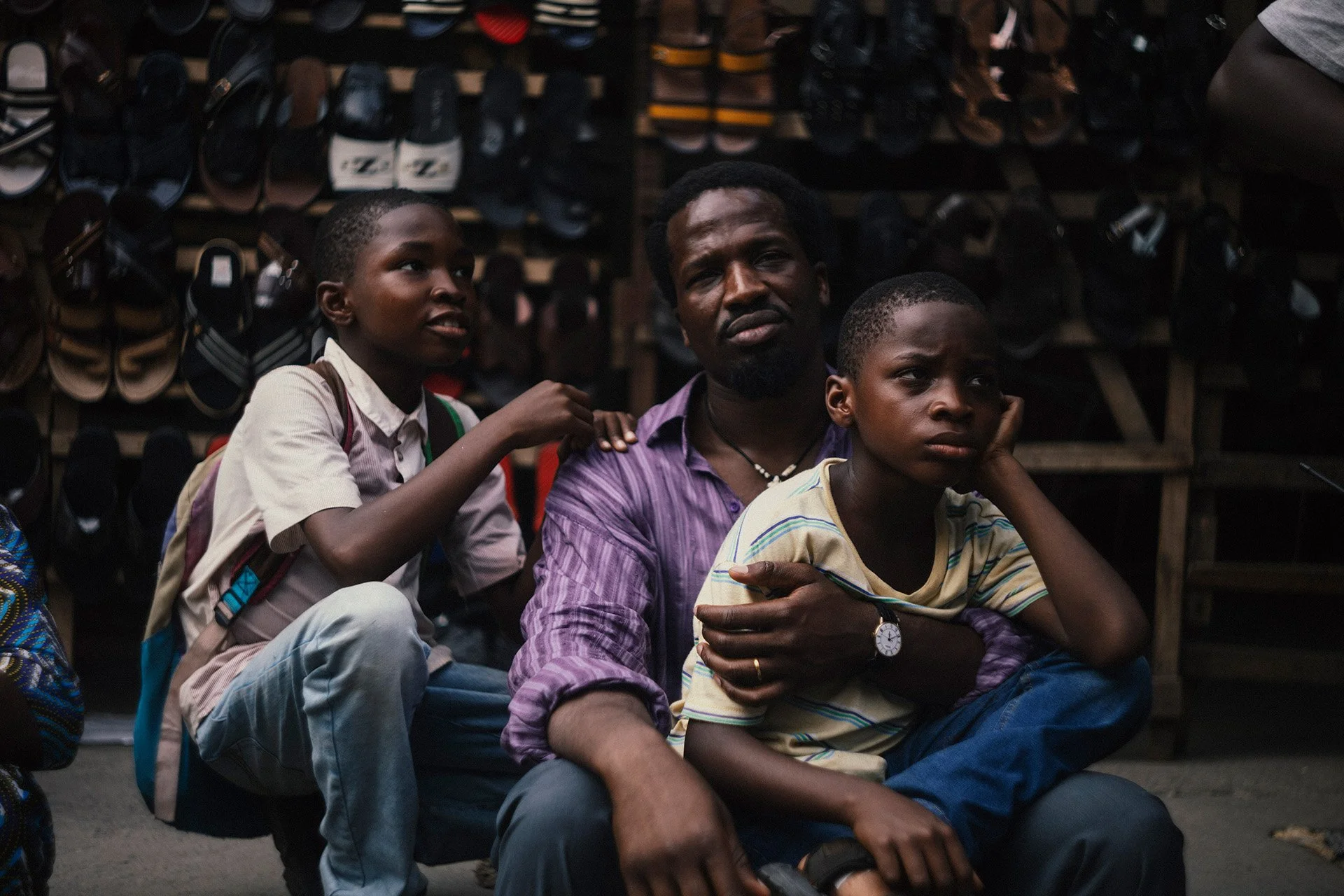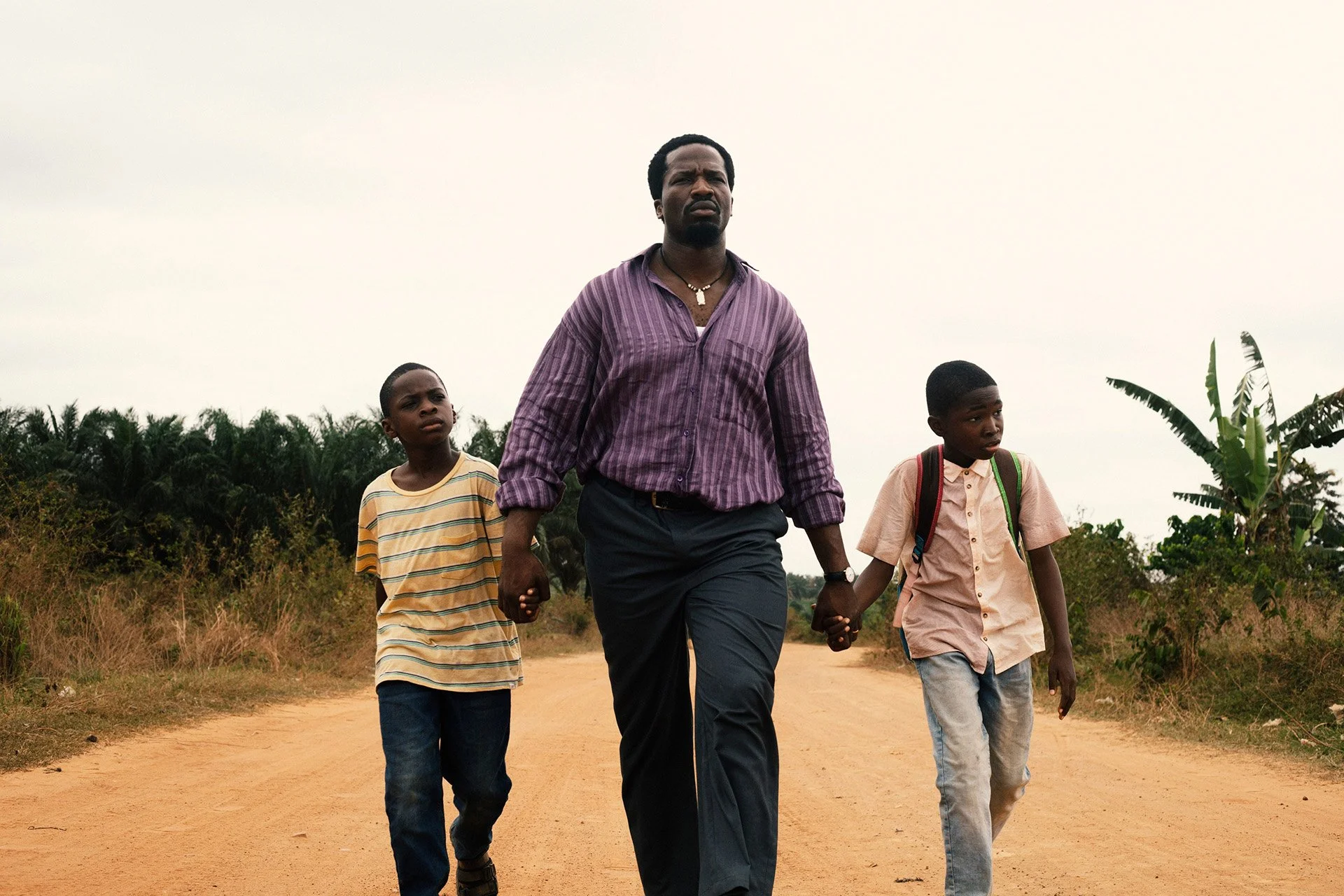Busan International Film Festival 2025 | Movie Review: “My Father’s Shadow” Seamlessly Blends Personal Memory and Historic Conflict in a Striking Feature Debut
12/12 ForReel Score | 5/5 Stars
Memory has been a key foundation of cinema from its inception. Akinola Davies Jr. seems keenly aware of this with his remarkable feature film debut My Father’s Shadow, the first Nigerian title to be presented in competition at Cannes, premiering in the Un Certain Regard section to great acclaim, and winning the Camera d’Or Special Mention at Cannes. In an interview with Tarik Khaldi at Cannes, The British-Nigerian filmmaker remarked that he wanted his first film to be ‘in service to my family, to our memories...a cathartic time capsule’. Davies was only 20 months old when his father, who he was named after, had passed away. My Father’s Shadow, co-written with his brother Wale Davis, invokes deeply personal territory in its tale of two brothers and their complicated bond with their estranged father. At the same time, it is also a portrait of national memory as the trio voyage into Lagos on the day of the 1993 Nigerian election crisis: military ruler Ibrahim Babangida, citing electoral irregularities, annulled the results indicating a victory for Moshood Abiola of the Social Democratic Party, pushing an already politically tumultuous country into further unrest. The juxtaposition between the personal and the collective in My Father’s Shadow is essential. Escalating political tensions threaten to rear its head and implode at any given moment, as the tenuous bond between father and sons shift between harmony and conflict. It is at once a portrait of a defining moment in a country’s history, while being an emotionally complex work of autofiction.
The opening of the film, through a striking montage of archival footage, contextualises the increasingly volatile political situation of militant presence and riots, before introducing us to the two brothers, Remi and Akin (played by real-life siblings Chibuike Marvelous Egbo and Godwin Egbo) in their rural home, playing with self-made action figurines and gently messing around with one another. Their mother is away for work; largely offscreen, she is frequently alluded to throughout the film as the responsible, unseen anchor to the family who provides its stability. The quiet, uneventful rhythm of the brothers’ day is suddenly upturned when their father Folarin (Ṣọpẹ́ Dìrísù) enters the picture, returning after a long absence as he questions them about a missing watch. Dìrísù has been making a name for himself as an up-and-coming British screen talent, and he instantly makes an unforgettable impression. His amiable yet resonant voice instantly calls the brothers and the viewer to attention, with Davies and cinematographer Jermaine Canute Edwards further emphasising his dominant, towering stature by how they position him in each frame. Dìrísù plays beautifully into the dualities of Folarin, who on one hand firmly instructs Remi and Akin on their responsibilities within the household and towards their mother, but also brims with sly, mischievous energy when proposing that they leave on an impromptu trip with him to Lagos, to collect his long overdue salary from his boss. It’s a marvellous performance that embodies both the shades of the father’s tougher, harsher nature but also his tender love for the boys. It’s hard to pin him down and that’s exactly the point. Davies keys in on every nuanced choice that Dìrísù brings as a performer as well as the reactions of the boys, revolving the film around Folarin as its dynamic, enigmatic core through Remi and Akin’s perspective. We can feel the frustrations of the boys at his absences so vividly, their desire to please him with good behaviour, and the excitement of joining him on an adventure.
Dìrísù and the Egbo brothers share great chemistry with one another, and there is a real joy in joining them as they trek to Lagos by various modes of transportation. The 16mm cinematography captures Lagos itself with loving, immersive detail to each corner of the city, while Davies also occasionally tipping his hand into more poetic imagery at points to create a sense of a hazy memory from the brothers’ point of view. This unique rhythm is crafted by editor Omar Guzmán Castro who also worked on another brilliant child’s perspective film recently, Lila Avilés’ Totém. Here, he plays around with time and space through the brothers’ eyes to further create this surreal, often dreamlike rhythm of seeing the world through their eyes. The film also cuts to quick, disconcerting flashbacks from Folarin’s perspective as a victim of some bloody, politically incited violence implied to be at Bonny Camp, a military cantonment in Lagos. Davies shows us the headspace of Folarin, weighed down by anxiety and trauma within, with these emotions surfacing most clearly in sequences where we move away from the child’s perspective, and hone in more closely with the adults. We see Folarin pushed to his emotional limits as he interacts with associates in Lagos, unable to find his boss to collect his wages, and even his optimism for the upcoming election results unsettled by the looming military presence. These heavy emotional burdens Folarin carries as the day goes by are expertly juxtaposed with the brothers’ scope of the world around them. They wave to a crippled young child in the street begging for alms, who cheerfully waves back; an innocent moment of connection in an often rather harsh world. Later on, as they gleefully play in an empty amusement park with their father, the sequence is undercut by the disconcerting, deliberately jarring sound design, where the unease of the political tensions of the day creep up into the fun they are having. Even Folarin’s optimism for the upcoming election results is unsettled by the looming military presence around Lagos.
Perhaps the most pivotal sequence in the film is one where Folarin and his sons bond by the beach. The camera positions us swimming alongside the trio as they play in the ocean, reminiscent of the sequence where Juan teaches Chiron to swim in Barry Jenkins’ Moonlight. The catharsis of this beautifully crafted sequence is given even greater poignancy when we learn that Folarin’s brother drowned at sea as a teenager. Folarin bares his soul to share his grief over his late brother to Remi, who was named after him, and gifts him a cherished cross necklace. The memory of Folarin’s brother Remi is eulogised through the son Remi, swimming with his father, bonding in the water together as an act of remembrance. But this sequence, carrying the warm bliss of a fond memory, is also underlined with a bittersweet recognition of memory’s temporality, and how the cherished time one spends with loved ones can be all too short. Like Juan in Moonlight, Folarin seeks to impart wisdom onto the younger generation: he sagely remarks that ‘everything is sacrifice. You just have to pray you don't sacrifice the wrong thing.’ His words convey wisdom, but Dìrísù’s eyes belie the guilt within Folarin of spending so much time away from family and having indeed, sacrificed the wrong thing. There is an intriguing contrast between the older Remi’s reverence of his father as this role model, compartmentalising his frequent absences as part of his duty and sacrifice for them, versus the younger brother Akin who has a more instinctual, directly emotional reaction to the father, calling out his excuses for being away from home so often. The emotional cost of separation can make the memories of those we love particularly strong, but also especially painful.
Fitting to its title, the film reckons with the central figure of Folarin as this ‘shadow’ of a memory that haunts over the narrative. The tumultuous political situation unfolds in the backdrop while we witness some shattering emotional revelations between father and sons. Remi and Akin must grapple with the identity of this man who brims with so much life and mystery, as the Davies brothers grappled with their own memories of their father through the filmmaking process. There is fondness and love, there is disappointment and disenchantment. Remembrance has no easy answers, and coming to terms with memories of those gone too soon will always be emotionally fraught. What My Father’s Shadow presents is a vivid portrait of a father gone too soon. A child’s invocation of ‘I will see you in my dreams’ bookends the film; through Remi and Akin’s eyes, a figure of memory brought to life through cinematic reverie.



